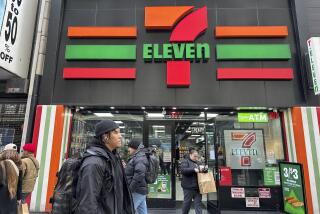Wexner Playing Low-Ball in New Carter Bid
- Share via
What’s the first thing you should understand about this new bid to take over Carter Hawley Hale Stores, the owner of the Broadway, Neiman-Marcus, Bergdorf Goodman and other stores? That it may go higher than the initial offer of $55 a share, and it should.
Chairman Leslie H. Wexner of the Limited Inc., who is bidding in partnership with shopping center developer Edward J. DeBartolo Sr., is said to be as sore as a spoiled child at having lost in his attempt to acquire Carter Hawley two years ago and to be determined to succeed this time. But, if so, he has offered a less-than-determined price.
Oh sure, the offer of $55 a share, or a total of $1.77 billion for all of Carter Hawley’s common and preferred stock, looks generous at first glance. It is 31% more than Carter Hawley’s price before the offer, more than 2 1/2 times the value of its shareholders’ equity and almost right on the estimate by analyst David V. Jackson of Morgan, Olmstead, Kennedy & Gardner of Carter Hawley’s breakup value--the total that the Los Angeles-based store chain would get if it sold all of its store divisions separately.
Nothing for Goodwill
But it’s hard to see where Wexner and DeBartolo are offering anything for what business calls goodwill, the value of the franchise names that Carter Hawley owns. It has Neiman-Marcus, for example, the 22-store chain that is synonymous with luxury and style. And it owns the Bergdorf Goodman store on New York’s Fifth Avenue, an incomparable outlet for high-priced women’s clothing and an entre to the big league world of fashion that Wexner’s the Limited Inc. does not yet possess, for all its success with specialty merchandise in its Limited, Lerner and Lane Bryant stores. Carter Hawley Chairman Philip M. Hawley bought the Neiman and Bergdorf names for a relative bargain back in the 1970s, when there was less demand for upscale stores.
Now they command a premium, but Wexner still would be smart to pay it for a name like Neiman-Marcus because it would take billions of dollars to try to build a chain with its cachet, presuming you could accomplish such a retailing feat at all. More than money, it takes the right combination of people and style to make a high-fashion store work.
Lost Key Bendel Executive
Wexner, the 48-year old retailing whiz from Columbus, Ohio, should know. Last year, he purchased the fashionable Henri Bendel store on New York’s 57th Street--and promptly lost that store’s guiding spirit, the talented Geraldine Stutz, who quit and is now editing a fashion magazine.
Yet so low-ball was Wexner’s offer on Tuesday that Wall Street analysts speculated that he must have made a prior deal with Chairman Richard A. Smith of General Cinema, which controls a crucial 38.6% of Carter Hawley’s stock. But Smith dispelled that notion Wednesday when he announced that General Cinema “has no intention of accepting such a proposal” from Limited-DeBartolo.
Is Smith, as Wall Street believes, merely angling for a higher bid? (Sixty dollars a share is mentioned.) Maybe he is, and maybe he isn’t. Smith, whose family-controlled General Cinema is the nation’s largest theater owner, has demonstrated an antipathy to takeovers in his own company. Last year, he changed General Cinema’s capitalization so that the voting power resides in a separate class of stock that only Smith and his family own.
Beyond his statement spurning the Wexner-DeBartolo bid, Smith kept his plans to himself on Wednesday. But it’s not inconceivable that he would turn down a takeover on philosophical grounds. Would that be a dumb business move?
It depends on your perspective. If you think that he should take cash now for his Carter Hawley stock, on which he is earning a 10% annual dividend, and put it to work in his General Cinema business, which regularly earns 23% on equity, then the answer is obvious.
But there are charms to Carter Hawley Hale, too. For one thing, the Broadway holds the largest market share of all the department stores in Southern California, and Phil Hawley has cemented the Broadway’s hold in recent years by aggressive price competition.
“It’s the most competitive market in the country,” says analyst Joseph Ronning of the Brown Bros. Harriman investment firm. That means it’s a tough market for department stores to make profits in--but tougher on Hawley’s competitors than on the Broadway, which can control the competitive heat and its own profit margins accordingly.
Should you pay a premium for the lead in one of the two largest retail markets in the country (the New York metropolitan area is the other)? You would in any other business.
Bottom line, as they say, is that General Cinema’s Dick Smith can sit with controlling ownership of such properties as Neiman-Marcus and Bergdorf, which are increasing in value, and the Broadway’s franchise and real estate assets in Southern California. Or he can sell them to Leslie Wexner and Eddie DeBartolo, two shrewd buyers who--from their initial bid, at least--look to be trying to get away with a steal.
More to Read
Inside the business of entertainment
The Wide Shot brings you news, analysis and insights on everything from streaming wars to production — and what it all means for the future.
You may occasionally receive promotional content from the Los Angeles Times.










